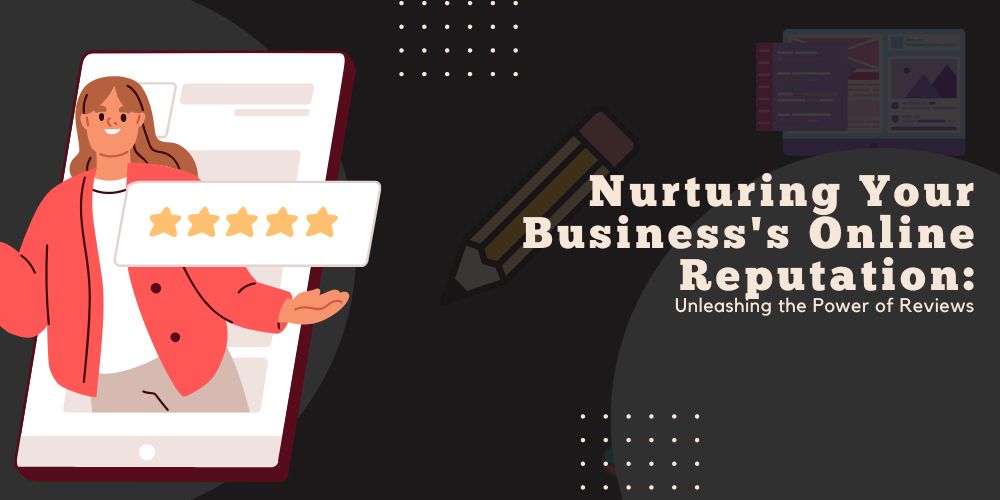In today’s world where information spreads like wildfire and customer opinions hold large influence, reputation management has become a crucial aspect of successful marketing.
Building a positive reputation and effectively managing customer reviews can make or break a business.
This aspect of marketing is like a garden that requires careful tending and nurturing …
In this article, we’ll look into the significance of reputation management, discuss how to ask for reviews, explore strategies to gather more reviews, and shed light on dealing with negative feedback.

The Value of Reviews
Reviews serve as a digital form of word-of-mouth marketing … and their impact on businesses cannot be overstated.
Positive reviews build trust and credibility, attracting potential customers to choose your products or services.
According to studies, around 90% of consumers read online reviews before making a purchase decision. By prioritizing reviews, you show your commitment to customer satisfaction, ultimately boosting brand loyalty and driving sales.
Asking for Reviews
When it comes to obtaining reviews, a simple request can go a long way.
Start by reaching out to satisfied customers through personalized emails, thanking them for their support and kindly asking if they would be willing to share their experience.
Utilize various channels, such as social media platforms and your website, to make the process convenient for customers.
The best time to send a request for a review to a customer is after a specific amount of time where the purchase is still fresh in their mind, but also given them enough time to try the product or service.
Gaining More Reviews
To generate a consistent stream of reviews, you need to actively engage with your customer base.
Create a seamless experience by integrating review platforms into your website, making it effortless for customers to leave feedback.
Additionally, promptly respond to reviews, both positive and negative, demonstrating your dedication to customer care. Encourage feedback on multiple platforms, such as Google My Business, Yelp, or industry-specific review sites, to cast a wider net and reach a larger audience.
Handling Negative Reviews
While no business desires negative reviews, they are an inevitable part of the online landscape.
Instead of ignoring or deleting unfavorable feedback, view them as opportunities for growth. Responding to negative reviews in a professional and empathetic manner shows that you genuinely care about customer satisfaction.
Address the concerns raised, offer solutions, and invite the reviewer to connect offline to further resolve the issue.
Potential customers value transparency and problem-solving skills, which can be showcased through constructive responses.
Proactive Reputation Management
Reputation management should extend beyond responding to reviews.
Actively monitor your online presence, keeping a keen eye on social media mentions and search engine results. Set up Google Alerts to receive notifications whenever your brand is mentioned.
Regularly update your website and social media profiles with accurate information, ensuring consistency across platforms. By proactively managing your reputation, you can address any potential issues before they escalate and maintain a positive online image.
Harnessing the Potential of User-Generated Content
Reviews are a powerful form of user-generated content that holds immense potential for your marketing efforts.
Beyond the traditional text-based reviews, consider incorporating visual elements such as photos or videos into your review collection process.
Visual testimonials have a greater impact on potential customers, providing them with a more authentic and engaging experience. Encourage customers to share their experiences through multimedia, allowing others to see firsthand the value your business brings.
You can then use these pieces of content in ads and other marketing materials as testimonials (which you’ll remember from our post about the Bottom of the Funnel that this is great content to convert audience into customers.)
RELATED: Learn what content works best at the bottom of the funnel to convert new customers …
Influencer Collaborations and Review Programs
Expand your reach by leveraging the influence of relevant social media influencers.
Partnering with influencers who align with your brand can introduce your business to their engaged audience. Consider offering them the opportunity to experience your product or service and share their genuine feedback.
By collaborating with influencers, you not only tap into their established trust and credibility but also gain exposure to a wider pool of potential customers.
Building Trust Through Social Proof
In the digital realm, social proof plays a pivotal role in building trust with potential customers.
Apart from traditional customer reviews, consider displaying trust badges, certifications, or awards prominently on your website. These visual cues help convey credibility and instill confidence in your brand.
Additionally, showcase testimonials from satisfied customers across various touchpoints, such as your website, social media profiles, and even email newsletters.
This multi-channel approach ensures potential customers encounter positive experiences and reaffirms your commitment to customer satisfaction.
Engaging with Customers Through Surveys
Beyond soliciting reviews, consider utilizing customer surveys to gain valuable insights and strengthen your relationship with your audience. Surveys provide an avenue for customers to share their opinions, suggestions, and preferences.
By actively seeking feedback, you demonstrate a genuine interest in understanding and meeting their needs.
Use survey data to identify areas for improvement, refine your offerings, and enhance the overall customer experience. Regularly communicate survey results and the actions you’ve taken based on customer feedback, showing that you value their opinions and are continuously striving to enhance their satisfaction.

Reputation Management Tools and Technologies
To streamline your reputation management efforts, explore the vast array of tools and technologies available.
Online reputation management platforms can help you consolidate and monitor customer reviews from various sources, saving you time and effort.
These platforms often provide sentiment analysis, allowing you to gauge the overall sentiment surrounding your brand and identify areas that require attention. Additionally, leverage social listening tools to monitor mentions of your brand across social media platforms and respond promptly to both positive and negative feedback.
Where To Start With Reputation Management
Reputation management is an ongoing journey that requires dedication, adaptability, and a customer-centric approach.
By harnessing the power of user-generated content, collaborating with influencers, incorporating social proof, engaging customers through surveys, and leveraging reputation management tools, you can nurture a thriving online reputation.
Remember, your customers’ voices are valuable assets that can shape the perception of your brand. Embrace their feedback, learn from it, and consistently strive to exceed their expectations.
By doing so, you’ll cultivate a strong online reputation that amplifies your marketing efforts and sets you apart from the competition.






